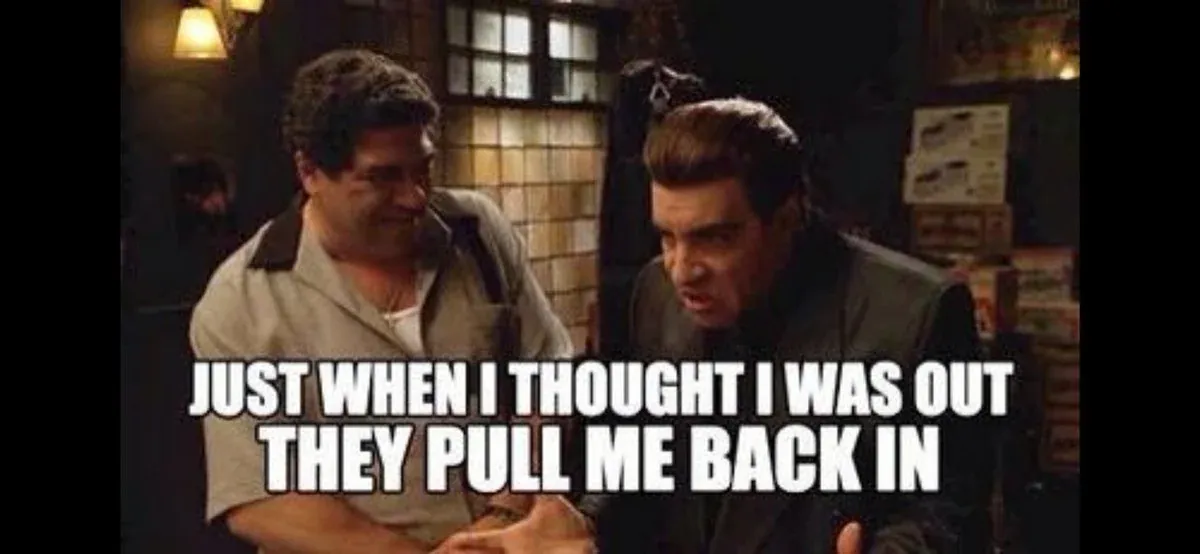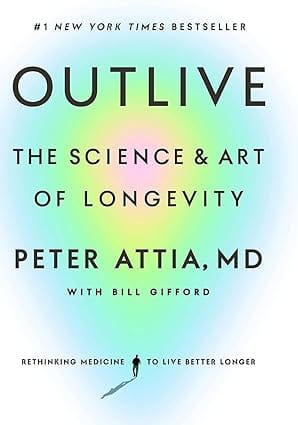The Longevity Hustle (and Plans for Second Breakfast in 2024)

Happy New Year, and welcome to the new Second Breakfast!
Based on the responses to the reader survey last year, I'm making a few changes — and not just to where the newsletter is hosted. Many of you said you missed Hack Education, and you wondered if maybe-please-oh-please I could write about ed-tech again. Bless your hearts. My goal, with Second Breakfast, is to write in much the same vein as my previous project, but to take that critical eye and turn it towards "health and wellness." Much of what I wrote about with regards to education applies to this sector as well, in no small part because everything for Silicon Valley (1) is an engineering problem: a matter of optimization, individualization, and gadgeteering (that's B. F. Skinner's word, not mine).
So expect weekly essays on how technology makers and funders and promoters seek to shape our bodies and minds, to shape the stories we tell about what's possible, what's desirable, what's measurable, what's efficient. We'll explore "wellness" technologies, fitness technologies, and sure maybe occasionally education technologies.

You also said in that survey that you liked reading about my personal experiences — with aging, with becoming an athlete, with exploring new technologies for myself. So I'll do some more of that too. I will say, it's not particularly surprising for me to test-drive new technologies and pronounce "well, this is garbage," so I'll try to come up with more interesting angles. That said, there's only so much time — for me to write and for you to read — and so the renewed focus on technology criticism means that I'm going to ditch the regular Monday morning sharing of breakfast recipes (2) and I'll write less about food in the weekly news roundup on Fridays too. Unless, that is, food technology becomes part of a major storytelling or investment push — you know, "the vegan mafia" kind of thing.
Of course, it's hard to separate fitness and food and health technologies out into neat and tidy categories. These are all part of the tech industry's love of "bio-hacking," the idea that we can improve our lives by applying the software engineer's ethos to our bodies, where everything can be measured, upgraded, optimized. As I noted in my year-end essay on fitness technology, there's been an explosion in "bro science," whereby a number of sciencey-sounding theories, gadgets, supplements, and "protocols" are promoted by various fitness practitioners/influencers/podcasters like Joe Rogan and Dr. Andrew Huberman, and by tech entrepreneurs/investors like Bryan Johnson, who was profiled over and over and over in 2023 for his very expensive, very "high tech," very ridiculous efforts to reverse his aging and extend his life.
As I also noted in that year-end essay, a fair number of high profile tech entrepreneurs and investors are hitting their late 40s and early/mid/late 50s — Elon Musk, Peter Thiel, Bryan Johnson, Jeff Bezos, Marc Andreessen, for starters — and appear to be, bless their hearts, going through some shit with regards to health, fitness, and/or fascism. It's gonna to be something to watch.

It was this fixation on longevity — not just theirs, to be fair, but in the culture at large (not a surprise after a global pandemic and what with falling life expectancy rates for men) — that prompted me to pick up and read Peter Attia's bestselling book Outlive over the holidays. In part, Attia's success stems from his incredibly popular podcast Drive which he launched four years ago (and the book, in many ways, rehashes this podcast content). But his public career actually began back in 2013 with a TED Talk (of course it did), in which he argued that the medical profession has diabetes — the disease, the treatment — all wrong and that a low-carb diet can actually solve the "obesity epidemic." Attia, along with journalist Gary Taubes (3), used the attention garnered from the TED Talk — that is, the attention from wealthy donors and venture capitalists who flock to this event — to fund the Nutrition Science Initiative, a non-profit dedicated to "good science" about nutrition and specifically to the global eradication of obesity and diabetes.
While Attia's website boasts his academic and professional credentials — educated at Stanford and Johns Hopkins, a research stint with the NIH — there's no mention of NuSi, perhaps because scientists were not able to substantiate the "carbohydrate-insulin hypothesis of obesity" (in a nutshell: that sugar makes you fat) that Taubes and Attia had so heavily promoted on the speaking circuit. Or perhaps because the organization went down in flames after alienating its funders and engaging in some very questionable efforts to pressure scientists and shape the conclusions of their research. NuSi "collapsed under the weight of its ideology," as another researcher in the field put it. But that hasn't stopped Attia from continuing to promote medical interventions — on his podcast and in his book — that are unsubstantiated by science.
Indeed, that's his whole schtick.
In Outlive, Attia argues that Medicine 2.0 — that is, medicine as it's practiced today (and has been practiced since the mid-nineteenth century, he argues) — is fixated on extending our lifespan at the expense of addressing our healthspan. Healthspan, he says, is the quality, not just the length of life. Attia advocates for Medicine 3.0, the use of these trailing digits should signal that he's invoking a powerful Silicon Valley trope here: the idea that the medical institution and its practices haven't changed in hundreds of years; that its practitioners — doctors, researchers — are in fact resistant to change. He also claims randomized controlled trials — "the gold standard" of research — are of limited use; that rules and regulations impede innovation and prevent us (doctors and patients) from taking the appropriate risks.
These all work in concert in ways that should be quite familiar to those who dare to question Silicon Valley-think: if you suggest Attia's claims are not substantiated by "the science," he (or more likely, his avid podcast followers) will accuse you being part of the old guard, so bound up in defending failed systems and protocols that you're unwilling and unable to take the big risks to radically change health outcomes. In education, "innovators" insist that teachers are the problem; teachers retort that, sure, they're unwilling to take unproven risks with other people's children; in Medicine 3.0, however, "innovators" like Attia can go directly to the consumer and suggest that they take risks with their own bodies — the promise of insights from more data gleaned through more testing and more technology.
By some reports, Attia charges $150,000 per patient per year for his concierge medical services. Of course, if you're charging this much, your clientele are not, like the rest of us, worried about whether or not one's health insurance will cover a procedure. But then again, if you're charging a patient $150,000 a year, you can't just perform the ol' 15-minutes of chit-chat during a routine physical exam, listening to someone's heartbeat and lungs with your stethoscope and glancing up their nose and into their ear canals with an otoscope. Otoscope, invented 1830. Stethoscope, 1816. "See?" Attia could say, "medicine hasn't changed in hundreds of years." If you're charging a patient $150,000 a year, you need do a bunch of very expensive, very "3.0" interventions, and Outlive subtly recommends these over and over — annual DEXA scans; annual colonoscopies; annual pap smears; annual MRIs; genetic testing ("I test all my patients for the APOE genotype," Attia writes. The genotype is linked to (but does not cause) the development of dementia and Alzheimer's); continuous glucose monitoring; and on and on and on. (Arguably Attia is single-handedly responsible for the growing popularity of these devices for people without diabetes, despite there being — once again — absolutely no evidence of their utility.)
There is little recognition in Outlive that poor health outcomes and shorter life expectancies may bound up in socioeconomic inequalities rather than outmoded medical practices. There is little recognition that, as such, these health disparities are public crises requiring public (read: government; read: systemic) intervention. Rather than offering a fix for everyone, the model that's promoted in the book is a high-price product for the individual, for the elite individual (those who, ironically, often end up with worse outcomes because they're willing to spend a bunch of money on useless tests and procedures so haha, joke's on them, I guess.)
But Outlive is, of course, a bestselling book — an "airport book," as I like to call them — the kind bought on the concourse and read by the business suits in first class, who don't know enough to question the scientific validity but believe anything Malcolm Gladwell (and the like) say and are happy to spread that sort of very nice storytelling. Storytelling that's then echoed in The New York Times, The Wall Street Journal and the like. Storytelling that may be ahistorical and pseudoscientific and ethically suspect but – no matter! – becomes mainstream. How can we live longer, healthier more fulfilled lives? Wait, the answer isn't socialism? The answer is a fucking DEXA scan?
Outlive is divided into three parts — the first, a critique of the medical industry; the second, an exploration of what Attia calls the "Four Horsemen," the chronic diseases of aging (heart disease, diabetes, cancer, and Alzheimers') that Medicine 2.0 has failed to cure; and the third, his suggestions on what we can do to live longer and healthier (which on the surface are surely good things to focus on): eat better, exercise more, sleep more. But the final chapter of Outlive turns from Attia the doctor to Attia the patient as he writes about his own struggles with his "emotional health" — his anger, obsessiveness, detachment, and his stints in various high-end mental health clinics and retreats. "Emotional health," he argues, "may represent the most important component of healthspan. Nothing else about longevity is really worth much without some degree of happiness, fulfillment, and connection to others. And misery and unhappiness can also destroy your physical health, just as surely as cancer, heart disease, neurodegenerative disease, and orthopedic injury." He's not wrong; but the chapter is just... yikes.
The bulk of Outlive fits into the larger health technology hustle that I want to explore here on Second Breakfast — the insistence that we can gadgetize and optimize ourselves to wellness. But this final chapter resonates with this sense that I have that something is very, very wrong with powerful men right now — particularly these middle age, TED-Talk, techno-entrepreneur types. (I'll repeat that list from above: Elon Musk, Peter Thiel, Bryan Johnson, Jeff Bezos, Marc Andreessen, for starters.) Ijeoma Oluo writes about this powerfully in the final chapter of her book Mediocre: The Dangerous Legacy of White Male America:
White male identity is in a very dark place. White men have been told that they should be fulfilled, happy, successful, and powerful, and they are not. They are missing something vital — an intrinsic sense of self that is not tied to how much power or success they can hold over others — and that hole is eating away at them. I can only imagine how desolately lonely it must feel to only be able to relate to other human beings through conquer and competition. The love, admiration, belonging, and fulfillment they have been promised will never come — it cannot exist for you when your success is tied to the subjugation of those around you. These white men are filled with anger, sadness, and fear over what they do not have, what they believe has been stolen from them. And they look at where they are now, and they cannot imagine anything different. As miserable as they are, they are convinced that no other option exists for them. It is either this, or death: ours or theirs."
What does it mean if this ideology is what's driving the development of health, wellness, fitness technology?
(1) I use that phrase not so much to reflect a geographic area but more as a shorthand for the practices and ideologies of the tech industry.
(2) What's for breakfast? So far this year, I've been back to making overnight oats (oats, milk, golden raisins, almonds, creatine) for first breakfast, with a smoothie (vanilla protein powder, banana, plain skyr, ground flaxseed, pureed butternut squash, frozen spinach, water) for the post-workout second breakfast. Some days, I actually need to, ya know, chew, and I'll have a bagel and Skippy peanut butter. Yes, it has to be Skippy.
(3) Taubes is arguably responsible for the narrative shift away from "anti-fat" and towards "anti-sugar," and as he has a new book out on diabetes, watch for lots of stories – with great bravado and questionable science – in the coming months on the problems with how we treat the disease.





